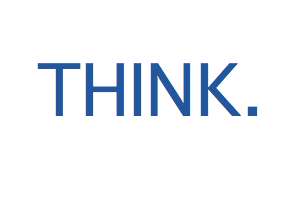We’re continuing our Thinker Thoughts this week with an article in Vanity Fair (June 12, 2017) entitled: “Is Social Media on the Table in 2020?” by Nick Bolton.
While it’s an article that should be read in its entirety, we’ve highlighted some of the most noteworthy thoughts:
We now live in a system that is designed to reward atrocious behavior…[a]fter the Manchester bombing, while parents and families were trying to desperately find their missing children, some used Twitter to share random photos of people they pulled off the Internet, proclaiming they were ‘missing.’ These misleading images were retweeted tens of thousands of times. Why? Simply because the users wanted to increase their followings…[s]ocial media is fast becoming a giant talent show for hundreds of millions of people to see who can be a bigger asshole…
Even some technology C.E.O.s are sounding the alarms…’Most of the time [technology] is a force for good,’ [Apple’s CEO Tim] Cook told the M.I.T. graduates. ‘And yet the potential adverse consequences are spreading faster and cutting deeper than ever before. Threats to our security. Threats to our privacy. Fake news, and social media that sometimes becomes anti-social.’ He noted that people are thinking and acting more like computers, without values, compassion or concern for others. ‘Sometimes,’ he continued, ‘the very technology that is meant to connect us, divides us.’
After the end of World War II, historians and politicians forcefully scrutinized the Nazi regime in the hopes of preventing a force like Hitler from ever emerging again. But they also focused on a deeper, underlying question: how did we let this happen in the first place?…[m]aybe it will be a decade from now, or maybe 50 years, but I’m almost certain that historians will one day posit the same question about the rise of the Internet and social media. And they may wonder why we didn’t collectively stop to wonder if this new invention, and the way we were using it, was going to advance the human race…
The systems we have created, it seems, are moving too fast, and yet it seems like there are two solutions to fix this. The first is technological….[t]he second solution is that we, the people who use these platforms, should try ourselves to slow down and take a deep breath before we spread something online, asking ourselves if it’s real or fake. That we should wait before we reply to a divisive post on social media, and realize that it’s highly unlikely that our viewpoint is going to change anyone else’s if we don’t respond in a kind and compassionate way. And that, most of all, in the same way it’s not your cell phone’s fault when you send a typo in a text message too quickly before reading it, that we should slow down online. If we don’t, the ramifications could be disastrous.”
